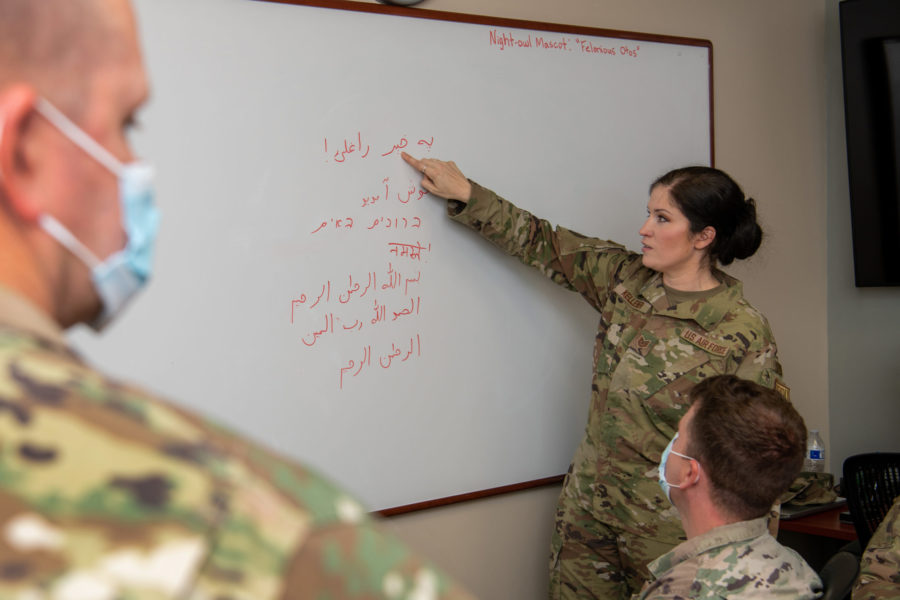The Air Force’s 12 Outstanding Airmen of the Year for 2022 will be formally recognized at AFA’s Air, Space & Cyber Conference from Sept. 19 to 21 in National Harbor, Md. Air Force Magazine is highlighting one each weekday from now until the conference begins. Today, we honor Tech. Sgt. Brianne E. Kelleher, the command language program manager for the 655th Intelligence, Surveillance, and Reconnaissance Group at Wright-Patterson Air Force Base, Ohio.
Kelleher is an Urdu linguist. Urdu is a tertiary language among the Afghan population—Dari and Pashto being the most widely spoken languages there—but its scarcity made Kelleher’s knowledge of it all the more valuable to those refugees for whom Urdu is primary. So when a tasker arrived to Kelleher’s Reserve unit to find Airmen to support Operation Allies Welcome, she didn’t need to be voluntold or even asked twice before signing up.
“My entire career is CENTCOM-centric,” Kelleher explained. “So … watching Afghanistan, watching Kabul fall … it rips your heart out.”
She was given 24 hours’ notice before heading to Task Force Holloman, which she described as “deployment conditions in the desert.” In just two days, Kelleher and her team assembled an entire language support cell to support a makeshift “village” of refugees. There was no infrastructure in place before the cell was created, meaning there were no existing plans for efficient communication with incoming refugees.
“These people that were coming in just went through the hardest situation in their entire life, and they want to make sure that they have support,” Kelleher said. “They’re actual living people that were counting on us.”

To remedy the situation and streamline the operation, Kelleher’s 23-member linguist cell created directional signage in Urdu, Dari, and Pashto and developed processes for translation and publishing dissemination. Over the two weeks of Operation Allies Welcome, her cell received 95 aircraft and processed more than 3,500 refugees through medical and visa procedures. Kelleher also developed a lost child alert system that distributed the information of lost refugees in their native language, ultimately reuniting more than 300 children with their families.
“It was chaotic, and messy, and things were not great,” she said. “[But] we all just worked in concert. It was [actually] quite a beautiful thing.”
Kelleher’s involvement with refugees and migrants extends beyond her support at Holloman. Back home in Dayton, Ohio, she and her husband, also an Urdu linguist, volunteer at local organizations to support Afghan and Somali families who are transitioning to American life. While the organizations support the families on “big picture” items such as paying for food stamps and finding jobs, Kelleher is able to fill in gaps and help refugees and migrants set up their internet at home, read their mail, or know where their local grocery store is.
“It’s very baseline, very intimate support,” Kelleher said. “[It can feel] a lot better than [helping with] the bigger stuff.”
In fact, one of the Afghan families she worked with closely in the Task Force Holloman “village” moved to Dayton. Kelleher visits them regularly to check on their well being, but also to play games, have dinner, and simply enjoy sharing time together.
“We consider each other family,” she said.
For Kelleher, having a heart for those people who need you is central to being a linguist. She said the Air Force’s culture helped shape her “get it done” attitude. That, combined with linguistic cultural training, is what made her and her cell’s efforts at Holloman so exceptional.
“I am not an island,” Kelleher added. “It’s all my linguists and all my leadership. All of us had to come together. I’m just the one who gets to wave and say thank you.”
Meet the other Outstanding Airmen of the Year for 2022:
